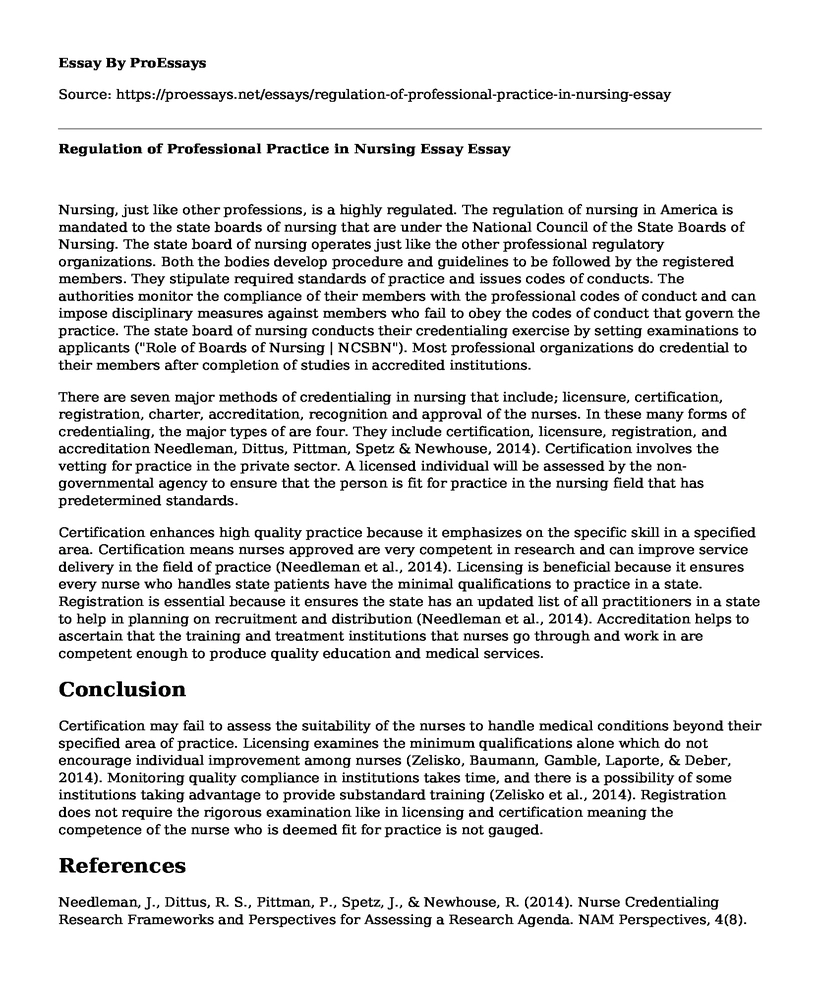Nursing, just like other professions, is a highly regulated. The regulation of nursing in America is mandated to the state boards of nursing that are under the National Council of the State Boards of Nursing. The state board of nursing operates just like the other professional regulatory organizations. Both the bodies develop procedure and guidelines to be followed by the registered members. They stipulate required standards of practice and issues codes of conducts. The authorities monitor the compliance of their members with the professional codes of conduct and can impose disciplinary measures against members who fail to obey the codes of conduct that govern the practice. The state board of nursing conducts their credentialing exercise by setting examinations to applicants ("Role of Boards of Nursing | NCSBN"). Most professional organizations do credential to their members after completion of studies in accredited institutions.
There are seven major methods of credentialing in nursing that include; licensure, certification, registration, charter, accreditation, recognition and approval of the nurses. In these many forms of credentialing, the major types of are four. They include certification, licensure, registration, and accreditation Needleman, Dittus, Pittman, Spetz & Newhouse, 2014). Certification involves the vetting for practice in the private sector. A licensed individual will be assessed by the non-governmental agency to ensure that the person is fit for practice in the nursing field that has predetermined standards.
Certification enhances high quality practice because it emphasizes on the specific skill in a specified area. Certification means nurses approved are very competent in research and can improve service delivery in the field of practice (Needleman et al., 2014). Licensing is beneficial because it ensures every nurse who handles state patients have the minimal qualifications to practice in a state. Registration is essential because it ensures the state has an updated list of all practitioners in a state to help in planning on recruitment and distribution (Needleman et al., 2014). Accreditation helps to ascertain that the training and treatment institutions that nurses go through and work in are competent enough to produce quality education and medical services.
Conclusion
Certification may fail to assess the suitability of the nurses to handle medical conditions beyond their specified area of practice. Licensing examines the minimum qualifications alone which do not encourage individual improvement among nurses (Zelisko, Baumann, Gamble, Laporte, & Deber, 2014). Monitoring quality compliance in institutions takes time, and there is a possibility of some institutions taking advantage to provide substandard training (Zelisko et al., 2014). Registration does not require the rigorous examination like in licensing and certification meaning the competence of the nurse who is deemed fit for practice is not gauged.
References
Needleman, J., Dittus, R. S., Pittman, P., Spetz, J., & Newhouse, R. (2014). Nurse Credentialing Research Frameworks and Perspectives for Assessing a Research Agenda. NAM Perspectives, 4(8). doi:10.31478/201408d
The Role of Boards of Nursing | NCSBN. (n.d.). Retrieved from https://www.ncsbn.org/517.htm
Zelisko, D., Baumann, A., Gamble, B., Laporte, A., & Deber, R. (2014). Ensuring Accountability through Health Professional Regulatory Bodies: The Case of Conflict of Interest. Healthcare Policy | Politiques de Sante, 10(SP), 110-120. doi:10.12927/hcpol.2014.23850
Cite this page
Regulation of Professional Practice in Nursing Essay. (2022, Jul 05). Retrieved from https://proessays.net/essays/regulation-of-professional-practice-in-nursing-essay
If you are the original author of this essay and no longer wish to have it published on the ProEssays website, please click below to request its removal:
- Essay Example - The Social Model of Disability
- Training of Employees Essay Example
- Dementia Prevention Among the Elderly Paper Example
- Research Paper on Adolescent Obesity
- Research Paper on Vaccine Hesitancy: A Global Health Threat in the XXI Century
- Breakfast: Cold Cereals & Eggs, Familiar Touchstones of the Day
- The Power of Films: Beyond Entertainment to Inspire and Inform







